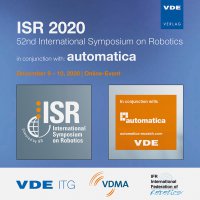Using Task-Specific Workspace Maps to Plan and Execute Complex Robotic Tasks in a Flexible Multi-Robot Setup
Konferenz: ISR 2020 - 52th International Symposium on Robotics
09.12.2020 - 10.12.2020 in online
Tagungsband: ISR 2020
Seiten: 8Sprache: EnglischTyp: PDF
Autoren:
Bachmann, Timo (German Aerospace Center (DLR), Institute of Robotics and Mechatronics, Wessling, Germany & Baden-Wuerttemberg Cooperative State University (DHBW) Mannheim, Germany)
Nottensteiner, Korbinian; Brena, Ismael Rodriguez (German Aerospace Center (DLR), Institute of Robotics and Mechatronics, Wessling, Germany & Technische Universität München (TUM), Chair of Sensor Based Robotic Systems and Intelligent Assistance Systems, Garching, Germany)
Stemmer, Andreas; Roa, Maximo A. (German Aerospace Center (DLR), Institute of Robotics and Mechatronics, Wessling, Germany)
Inhalt:
Planning new complex robotic applications requires the knowledge whether and where a specific task is executable within the reachable space of a robotic system. The complexity of a reachability analysis increases when the setup is reconfigurable or consists of multiple robots sharing the same workspace. In this work we show an approach to decouple task-specifications from system-wide configurations to compute task-specific workspace maps. These maps are a powerful tool for designing and planning robotic tasks, since they allow to visualize and suggest feasible poses for task execution. Furthermore, the maps can be queried during runtime to select appropriate poses automatically. Specifying a task manually takes time and effort since it is necessary to define a set of transformations with respect to a task reference frame. To overcome this issue, we show a solution by recording the motion of a robot to generate a task specification. The presented approach offers solutions for flexible systems with reusable components to make robust predictions regarding the kinematic reachability of the robotic setup.


